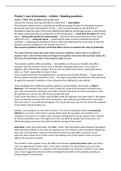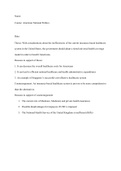Theme 7: Law & Economics – Articles + Reading questions
Coase 1960: The problem of social cost
Certain firm’s actions have harmful effect on other firms externalities
The economic analysis of such a situation has usually proceeded in terms of a divergence between
the private and social costs (product) of firms most economists agree on the idea that it is
desirable to make the owner of the harm inflicting firm liable for the damage caused, or alternatively,
the owner should pay taxes to compensate for the damage done Coase does not agree with these
ideas both parties should be treated equally A harms B, but to avoid the harm to B it would
inflict harm on A reciprocal nature comparing the values of what is obtained and what is
sacrificed comparing the situations of firms A and B and exploring what can be done to solve the
problem, because avoiding harm for B causes harm for A.
The economic problem in all cases of harmful effects is how to maximise the value of production.
The Coase Theorem states that under ideal economic conditions, where there is a conflict of
property rights, the involved parties can bargain or negotiate terms that will accurately reflect the
full costs and underlying values of the property rights at issue.
The economic problem with externalities Externalities are the costs or benefits that affect
someone who did not ask for these costs of benefits. Naturally, legal costs, or the costs of
litigation, often fall into this category. The law aims to justify these costs by making the person
who is at “fault” responsible for most of them.
Coase mentions that this cost apportioning is not always economically efficient. Coase argues
that we should eliminate transaction costs. He argues that parties should barter with each other
to apportion expenses, leading to a fairer allocation than letting the courts decide.
Coase challenges the traditional economic approach to externalities, also known as Pigou’s
Approach. The example often cited is that if a plant (X) causes $100 damage in pollution every
year, the law should tax it $100 per year until it is fixed. If the plant can install a product to clear
the pollution at a cost of, say, $90, the tax penalty will stop.
Coase claims that there is a major social problem with this approach. He claims that if X (the plant),
gives out pollution harming Y (the local community), then making X pay $100 to the community
each year allows Y to benefit by damaging X. The tax penalty each year has not solved the problem.
It has simply created another one.
Instead, Coase proposes an alternative solution. This involves looking at what is economically
efficient for everyone, which doesn’t always follow what the law states. For example, if it is
cheaper for X to pay for Y to move away, instead of paying $100 in tax per annum, then Y should
be moved somewhere else. This might cost X $40, not $100. By taxing X $100 every year, X is
effectively paying more than the $100 of pollution damage it has caused.
Internalize, rather than externalize, the costs = fairer. Once the parties agree between themselves
what the fairest solution is, the costs are typically very low. However, when the parties litigate the
issue, the costs skyrocket. Lawyers must determine who has what rights, how they can be
enforced, and a whole host of other issues. Internalizing costs at the outset is fairer and more
efficient for everyone involved.
The problem, Coase explains, lies in the difference between social and private costs. How these
costs are apportioned is often unfair. In the above example, the unintended social cost is the
damage to the community, i.e. pollution. The law typically forces the party at fault to cover these
costs. Coase suggests we need to entirely reimagine the benefits of the polluting activities as
weighed against its downsides.






